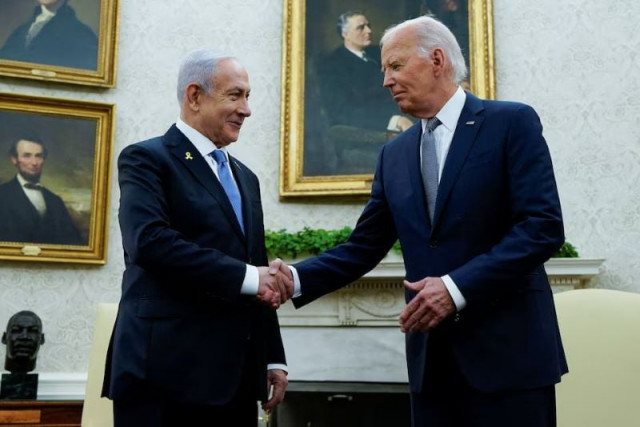Biden uncertain if Netanyahu delaying Gaza ceasefire to influence US election
"Whether he’s trying to influence the election, I don’t know, but I’m not counting on that:" US President Joe Biden.

US President Joe Biden expressed uncertainty on Friday about whether Israeli Prime Minister Benjamin Netanyahu is intentionally delaying a ceasefire deal in Gaza to influence the upcoming US presidential election.
Speaking at a surprise press briefing, Biden responded to questions about whether Netanyahu might be holding off on an agreement to harm the Democratic Party’s chances in November.
"Whether he’s trying to influence the election, I don’t know, but I’m not counting on that," Biden told reporters.
He also reiterated the US's longstanding support for Israel, asserting, "No administration has helped Israel more than I have. None, none, none. And I think [Netanyahu] should remember that."
Biden’s comments come amid growing concerns within the Democratic Party that Netanyahu’s actions—or lack thereof—could be an attempt to sway the election.
Democratic Senator Chris Murphy suggested earlier this week that Netanyahu's reluctance to finalize a ceasefire deal could be politically motivated.
This comes at a time when Biden’s administration has faced criticism for its handling of the Israel-Gaza conflict, with some pointing to the negative impact it may have on Biden's approval ratings, particularly among Arab-American voters.
Polls indicate that the failure to secure a ceasefire in the escalating Gaza conflict could hurt the Democratic Party in the upcoming election.
Vice President Kamala Harris, who is the Democratic candidate, has faced declining support in part due to the administration’s stance on the ongoing violence in the Middle East.
Previously, senior adviser to Harris met with American Muslim and Arab leaders on October 2 as part of Harris' presidential campaign efforts to regain support from voters frustrated by the US backing of Israel's military actions in Gaza and Lebanon.
For months, President Biden, a self-declared Zionist, has been advocating for a diplomatic solution between Israel and Hamas.
On several occasions, he has signaled that a ceasefire agreement was close, with a deal expected to include the release of hostages.
However, no agreement has yet been reached, and tensions continue to rise in Gaza and across the region.
While Biden’s administration has primarily blamed Hamas for the stalled negotiations, the president has shown increasing frustration with Netanyahu. In recent remarks, Biden criticized the Israeli prime minister for not doing enough to move toward an agreement.
Netanyahu, however, has publicly rejected claims that a deal is near. Earlier this month, he stated that "Hamas is not there with a deal. There’s not a deal in the making, unfortunately," just hours after US officials suggested an agreement was close.
Despite decades of close ties between Biden and Netanyahu, the relationship between the two leaders has become increasingly strained.
This stands in contrast to Netanyahu’s friendly relationship with former US President Donald Trump, the current Republican nominee. As Biden continues to push for a ceasefire,
Netanyahu has pressed forward with military actions in both Gaza and southern Lebanon, further complicating diplomatic efforts.
The situation is further heightened by Israeli concerns about Iran's role in the conflict.
Biden addressed speculation about potential Israeli strikes on Iranian oil infrastructure, following reports that Israel is considering such actions in retaliation for an Iranian ballistic missile attack.
"The Israelis have not concluded what they are going to do in terms of a strike," Biden said, adding that if he were in Israel’s position, he would consider alternatives to targeting oil fields.
With the US presidential election set for November 5, the ongoing conflict and Netanyahu's actions will likely continue to weigh heavily on the campaign and US-Israel relations.



















COMMENTS
Comments are moderated and generally will be posted if they are on-topic and not abusive.
For more information, please see our Comments FAQ